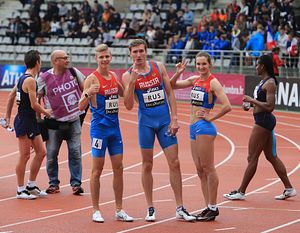The world of international sports has been shaken in recent years by ethical quandaries galore: from FIFA’s corruption to “sportswashing” human rights violations with fast cars to doping at the Olympics.
The still-unfolding Olympic doping scandal will dominate through the summer as the XXXI (31st) Olympiad takes place in Rio de Janeiro, Brazil in August. It’s the South American continent’s first Olympics and will be Kosovo and South Sudan’s first games. There will be more than 300 medals up for grabs across 28 sports, and more than 10,000 athletes are expected to complete.
That list just got a bit shorter, however. This week, the International Olympic Committee (IOC) backed the decision by the International Association of Athletics Federations (IAAF) to maintain the organization’s ban on the participation of the Russian Athletics Federation (RusAF) in international track and field competitions. The Russian team was suspended provisionally in November 2015 after the World Anti-Doping Agency (WADA) released a report detailing Moscow’s manipulation of the anti-doping process. WADA’s investigation was prompted by a 2014 documentary from ARD that alleged Russia was “making” winners through doping.
The IOC declared that it would “fully respect” the IAAF’s decision to maintain the ban. The IAAF decided on June 17 to refrain from lifting the ban, noting that the Russian Federation had not met requirements for reinstatement. A press release noted the “deep-seated culture of tolerance (or worse) for doping that led to RusAF being suspended in the first place appears not to have changed materially to date.”
But the IOC seems to have left the door to Olympic glory slightly ajar: athletes from “non-compliant” countries can be declared clean and therefore become eligible to compete. The IAAF agreed to amend the rules to “allow Russian athletes to apply for eligibility, on an exceptional basis and subject to meeting strict criteria, to compete in international competitions, including the Olympic Games, in an individual capacity as neutral athletes, not under any country’s flag.”
So Russians may run to glory in Rio, but not under their country’s flag.
Russian Sports Minister Vitaly Mutko told TASS, “We’re ready to work” and that Russia would not boycott the Rio Games. Reuters reported, however, that the Russian Olympic Committee is considering suing the IAAF.
On one hand, the scandals seem like trivial matters. Who cares if a weightlifter takes steroids and breaks a world record? Or if a speed walker dopes their way to gold? Meanwhile, the considerable efforts taken to detect such sporting sins have been exposed as hardly adequate. A New York Times article, which dove into just how Russia managed to dupe the anti-doping system, outlined the basic premise of the system they fooled:
At all major international athletic competitions, athletes are required to submit a urine sample for testing. The sample is divided into two bottles. One, the A bottle, is tested immediately; the other, the B bottle, is sealed and stored for up to 10 years, in case the athlete’s past performance is ever called into question.
How much does it cost to keep a decade’s worth of B urine samples safe and sound in order to check later whether someone took a performance-enhancing drug? A sports-cynic may ask: are there better things on which to spend the likely considerable sum it takes to properly store literally thousands of urine samples?
On the other hand, sports are an arena of both big business and big politics, there’s money and pride aplenty at risk. With nearly every country in the world posting a team–no matter how small–the reputational weight of the Olympics only grows.
The United States leads the overall medal count with 2,681 across both Winter and Summer Games. The Soviet Union still stands in second, despite its dissolution 25 years ago, with 1,204 medals. With 519 medals, the modern Russian state isn’t terribly far down the list, considering it only returned to competition as a single state in the 1994 Lillehammer Winter Games.
As the IOC and other international sporting bodies reanalyze their stocks of gold medal urine samples, Russia’s medal count might deflate further, dealing an insulting blow to Russia’s national ego, already beleaguered by widespread criticism.

































